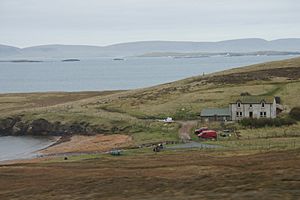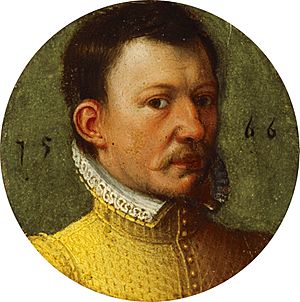Olave Sinclair facts for kids
Olave Sinclair was a very important official on the Shetland islands in the 1500s. He was known as the "foud," which was like a chief administrator or sheriff. His main job was to collect taxes for the Scottish king or queen. Olave lived in places like Havera (South Havra) and Brow. His name is sometimes spelled Oliver, Ola, or Olaf.
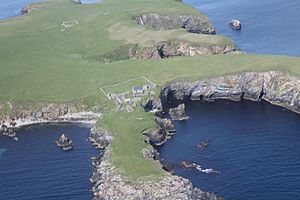
Contents
Olave Sinclair and the Battle of Summerdale
Olave Sinclair was present at a big event called the battle of Summerdale in 1529. He was later cleared of any wrongdoing related to the death of John Sinclair, 3rd Earl of Caithness. Olave Sinclair was probably a close family member of Edward Sinclair of Strome. Edward was also a foud in Shetland during the 1530s.
Disputes with the MacLeods of Lewis
Stories say that Olave Sinclair was blind in one eye. This happened when he jumped from Sumburgh Head to escape some attackers from the Isle of Lewis. One story explains that Sinclair had a disagreement with William MacLeod of Lewis. MacLeod's wife had inherited lands in Shetland. The MacLeods tried to capture Sinclair twice. But his friends from Fair Isle helped him escape.
Sinclair was involved in a serious conflict in June 1543. This event involved a person named William Lewis or Lowis and his three helpers on Shetland. The attacker from Lewis was traditionally called Hucheon MacLeod. He seems to have been Hugh Morrison, who was a judge from Lewis. Hugh Morrison later caused the death of Olave's son, Henry Sinclair, around 1551. In October 1564, Mary, Queen of Scots officially pardoned Sinclair for this event.
The Foud of Shetland
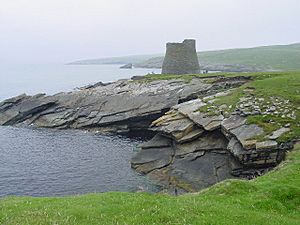
Olave Sinclair was the foud or foud depute. The foud was like a sheriff or manager for the Lordship of Shetland. He was sometimes called the "foud and chamberlain" or "Sheriff of Shetland." He led the Sheriff Court of Shetland in March 1561. This court was held at Laxfirth, which is near Tingwall Airport. A letter from December 12, 1561, confirmed his job. It called him the "chamberlain and bailiff of our lordship and lands of Shetland, both mainland and islands." The word "foud" comes from Danish or Norn. This shows the long history of the islands.
As foud, Sinclair collected taxes for the Scottish crown. These taxes were paid in money and farm products. He sent these to Edinburgh. The taxes often included dairy products. Butter, called "fat goods," was packed into barrels in Kirkwall on Orkney. Then it was shipped to Leith. The queen's money manager, Alexander Durham, sold these goods. The money helped pay for the household expenses of Mary, Queen of Scots. Andrew Lamb of Leith was one of Sinclair's business contacts.
Food from Orkney was well-known at the Scottish court. In December 1566, there was a special show for the baptism of James VI. This event was at Stirling Castle. During the show, songs were sung in Latin. These songs honored the food and the hosts. Characters in the show even represented the Orkney Islands.
Sinclair owned several farms. He got the south house of Reawick in Sandsting in 1544. This was part of an exchange. In July 1558, Scottish ships from Aberdeen attacked an English fleet. The Scottish sailors took cattle and other goods belonging to Sinclair from Mousa. Sinclair asked for payment from the owner, Thomas Nicholson, in the Edinburgh courts.
Managing Accounts and Permits
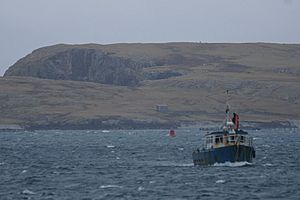
Robert Stewart of Strathdon was a half-brother of Mary, Queen of Scots. He later became the Earl of Orkney. In 1565, he was given the lands of Orkney and Shetland. William Murray of Tullibardine, who was the Comptroller, was appointed as foud. Sinclair continued his work and was called the "foud depute." In July 1567, the Privy Council of Scotland asked Sinclair to report on the queen's income. They wanted him to come to Edinburgh to show his accounts to the lords.
Sinclair's records were kept in the Exchequer Rolls. These were prepared for Murray of Tullibardine. In 1566, Sinclair collected a large amount of money and cereal. In 1567, he collected even more. In later years, the Shetland taxes were recorded as coming from Robert Stewart, 1st Earl of Orkney.
Sinclair's job also included writing special permits. These permits were for Hanse merchant captains. For example, Johan Kordes of Bremen got a permit in 1560. This allowed him to use the harbor of Baltasound. In August 1563, Sinclair wrote to the leaders of Bremen. He told them about Kordes and other traders. He said that some traders without permits were using up the island's resources. In September 1567, Sinclair wrote a statement for Gerdt Hemeling of Bremen. Hemeling's ship and fish cargo had been taken from his trading spot. This was done by the Earl of Bothwell, who was briefly the Duke of Orkney. Sinclair had a legal assistant named Peter Hog. Hog wrote Sinclair's official documents. He also helped Sinclair sign his name. Hog was called the "Sheriff Clerk of Shetland." Sinclair's helper, Henry Nauchty, also wrote documents.
Bothwell and Sinclair
A Scottish history book, the Diurnal of Occurrents, mentions that Bothwell had dinner with Sinclair in Shetland. This was in August 1567, after Bothwell had to flee from the battle of Carberry Hill. The English ambassador in Edinburgh, Nicholas Throckmorton, wrote about this. He said that Sinclair, a "principal man of the Isle," supported Bothwell. He thought Sinclair would help Bothwell escape from those chasing him.
In January 1568, Bothwell wrote about meeting the Bremen captain Gerdt Hemeling. This meeting was at Sinclair's house on Unst. Bothwell had hoped that Hemeling's ships would join his own fleet. But the people chasing Bothwell arrived at Unst. This messed up Bothwell's plans. He then joined another merchant at Scalloway and sailed to Norway. Bothwell took one of Hemeling's ships with him.
Later Life and Death
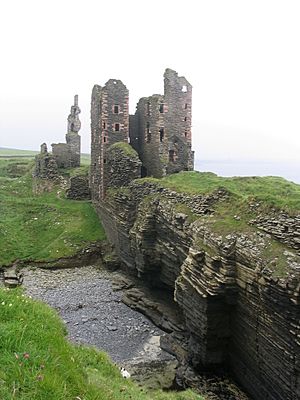
Olave Sinclair faced difficulties later in life. He lost his important job as foud. He became very ill in Kirkcaldy. Sinclair was taken north to Girnigoe Castle in May 1573. By then, he could not speak or move.
Olave Sinclair made his will in 1571. He divided his properties among his three sons. He followed the traditional udal law for this.
Arthur Sinclair of Eisweck (Eswick) was a sheriff in Shetland in March 1572. Laurence Bruce took over the foud's job in 1571. By April 1573, Bruce was the "undoubted foud, sheriff depute and chamberlain of Shetland." The House of the Binns near Linlithgow was built later. Its owner, Thomas Dalyell, made his money from importing butter from Orkney and Shetland.
Family
Olave Sinclair had several children:
- William Sinclair of Underhoull on Unst. He married Marjorie or Margaret Stewart (who died in 1607). She was the daughter of John Stewart, Commendator of Coldingham. Her second husband was William Bruce of Symbister.
- Henry Sinclair. He died in a conflict with Hugh Breif, also known as Hugh Morrison.
- Matthew Sinclair of Ness. He died in 1602.
One of his sons was planned to marry Katrine Halkat in 1547. She was the daughter of Robert Halkat, a church minister. A daughter of Olave married Richard Leask. Richard Leask died in a family dispute.
 | Madam C. J. Walker |
 | Janet Emerson Bashen |
 | Annie Turnbo Malone |
 | Maggie L. Walker |


